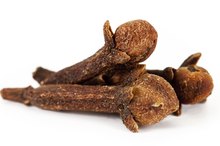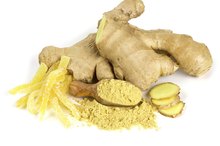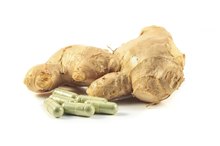What does fact checked mean?
At Healthfully, we strive to deliver objective content that is accurate and up-to-date. Our team periodically reviews articles in order to ensure content quality. The sources cited below consist of evidence from peer-reviewed journals, prominent medical organizations, academic associations, and government data.
The information contained on this site is for informational purposes only, and should not be used as a substitute for the advice of a professional health care provider. Please check with the appropriate physician regarding health questions and concerns. Although we strive to deliver accurate and up-to-date information, no guarantee to that effect is made.
Ginger & Heart Rate
People use ginger root to flavor foods and also as an herbal medicine to treat or prevent conditions including nausea, morning sickness, arthritis and inflammation. Although the amount of ginger used in foods is unlikely to cause side effects, the amount sometimes taken for medicinal purpose may cause side effects and interact with medications.
Calcium Channel Blockers
Calcium channel blockers are a type of medication used to treat high blood pressure and lower your risk for heart disease and heart attacks. If you take this type of medication, which includes amlodipine, diltiazem, felodipine, isradipine, nifedipine and verapamil, you should not use ginger as an herbal medicine as it may cause a dangerous interaction.include:
- If you take this type of medication
- which includes amlodipine
- diltiazem
- felodipine
- isradipine
- nifedipine
- verapamil
- you should not use ginger as an herbal medicine as it may cause a dangerous interaction
Ginger and Heart Rate
Can You Eat Too Much Ginger?
Learn More
Should ginger interact with calcium channel blockers, it can increase the effect of this medication, causing your blood pressure to become dangerously low. When your blood pressure drops too low it can cause your heart rate to become irregular, according to MedlinePlus. If you do not have low blood pressure or a heart condition and do not take blood pressure medications ginger is unlikely to cause an irregular heart beat.
- Should ginger interact with calcium channel blockers, it can increase the effect of this medication, causing your blood pressure to become dangerously low.
- When your blood pressure drops too low it can cause your heart rate to become irregular, according to MedlinePlus.
Ginger Side Effects and Safety
In healthy individuals, ginger side effects tend to be relatively mild and include:
- upset stomach
- nausea
- mouth irritation
- heartburn
- gas
- belching
- bloating
Consuming powdered ginger is more likely to cause these side effects than consuming ginger root or ginger capsules. Ginger may also cause blood sugar to drop, and it may cause your blood to thin, so do not take ginger if you are diabetic or take blood thinners.
Considerations
Remedies for Nausea When Coughing
Learn More
Much of the evidence for the use of ginger in herbal medicine is still preliminary and contradictory 1. Do not take ginger without first speaking with your doctor to make sure it is safe for you, and don't self-treat any condition with ginger instead of following the treatment prescribed by your doctor.
Related Articles
References
- National Center for Complementary and Alternative Medicine; Ginger; May 2006
- University of Maryland Medical Center: Ginger
- National Center for Complimentary and Integrative Health. Ginger. Updated September 2016.
- Memorial Sloan Kettering Cancer Center. Ginger. Updated October 30, 2018.
- University of Texas, El Paso/Austin Cooperative Pharmacy Program & Paso del Norte Health Foundation. Herbal Safety: Ginger.
Writer Bio
Based in Massachusetts, Jessica Bruso has been writing since 2008. She holds a master of science degree in food policy and applied nutrition and a bachelor of arts degree in international relations, both from Tufts University.









